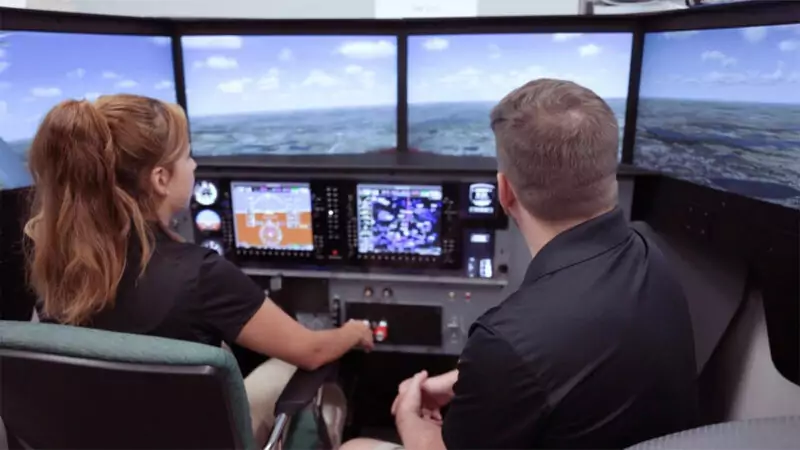Polk State Aerospace remains on cutting edge of technology to prepare aspiring pilots

Polk State College Aerospace is revered as a quality program that provides aspiring pilots with the most realistic flight experiences possible before they ever step foot in the cockpit. A recent equipment acquisition builds on this promise to students.
Regarded as one of the best flight simulators for training, the full motion Redbird FMX headlined a slew of recent infrastructure upgrades for the Aerospace Program. The $72,000 purchase was part of more than $200,000 worth of upgrades by the program this fall. Its cost was completely covered through Higher Education Emergency Relief Fund (HEERF) grant funding.
“It makes you feel like you’re actually flying the airplane, so it makes it more realistic for the students,” said Jorge Reinberg, Polk State Aerospace graduate and instructor for Sunrise Aviation. “As far as programming the airplane, flying it, getting the checklist closed down, it’s pretty accurate.”
Whereas before the simulators were stationary, the Redbird FMX moves and simulates actual flight and includes several features. The acquisition marked the first time in more than three years that the Aerospace Program added new simulators.
“It’s almost one-to-one as to what you’d get in the cockpit,” said Isaac Castellanos, a fourth-year student and captain of the Polk State Flight Team. “The simulator paints the picture of the instruments and how you interact with each one.”
Both Castellanos and Vanessa Hernandez, who are each pursuing an Associate in Science in Professional Pilot Science, said that the new simulator is a great tool for preparing newcomers for flight. The simulator, they noted, allows students to familiarize themselves with the instruments in the cockpit and feel comfortable before they ever enter a plane.
“As you get more in-depth as an Aerospace student, you use it quite often,” said Hernandez, a second-year student. “Your first lessons are in the simulator. The simulator gives you a really good base.”
Later this year, a wall will be added to make the simulator fully enclosed. With recent enhancements, each of the program’s simulators can now be programmed to imitate single- or multi-engine flight.
“With that technology, it allows us to acclimate new students. We get a wide variety of people who come into this program,” Castellanos added. “We have students who already have experience flying and we have students who are brand new to flying as a concept and are looking to start a career. For them to be able to have this technology, it gives them a better idea what to expect and a better learning curve from where to start in flight training. It makes a huge difference.”
As vital as the simulator is to the program, it has also been a useful tool for the Polk State Flight Team. Following a fourth-place finish at the National Intercollegiate Flying Association (NIFA) Region IX competition, the Flight Team will take part in the NIFA Safety and Flight Evaluation Conference (SAFECON) in Wisconsin in May. It marks the third straight year that Polk State has qualified for the national competition.
“It is a huge addition to our flight team,” Angelica Jung, a first-year student pursuing the Associate in Science in Professional Pilot Science and team member, said of the simulator. “We use it to practice for a lot of the competition brackets. The flight team spends a lot of time in our simulator. We spend a lot of time afterhours.”
While the Flight Team looks to build on its best-ever finish at nationals, 21st overall last year, the Aerospace Program has established itself as a quality, cost-effective program that utilizes a state-of-the-art, future-focused approach to training modeled around the real-world operations of the aerospace industry. It offers four degrees, including a Bachelor of Science in Aerospace Sciences with concentrations in Aerospace Administration and Professional Pilot.
With graduates flying for Amazon, Delta, JetBlue, Southwest Airlines, and Frontier Airlines among others, the Aerospace Program boasts a 94% Initial Check Ride pass rate. The program holds a 100% pass rate on the second attempt.
“I started here as a private pilot student,” Reinberg concluded. “Polk State has really helped direct me the right way and provide the tools I needed to get to where I am today. It’s an overall great program.”

